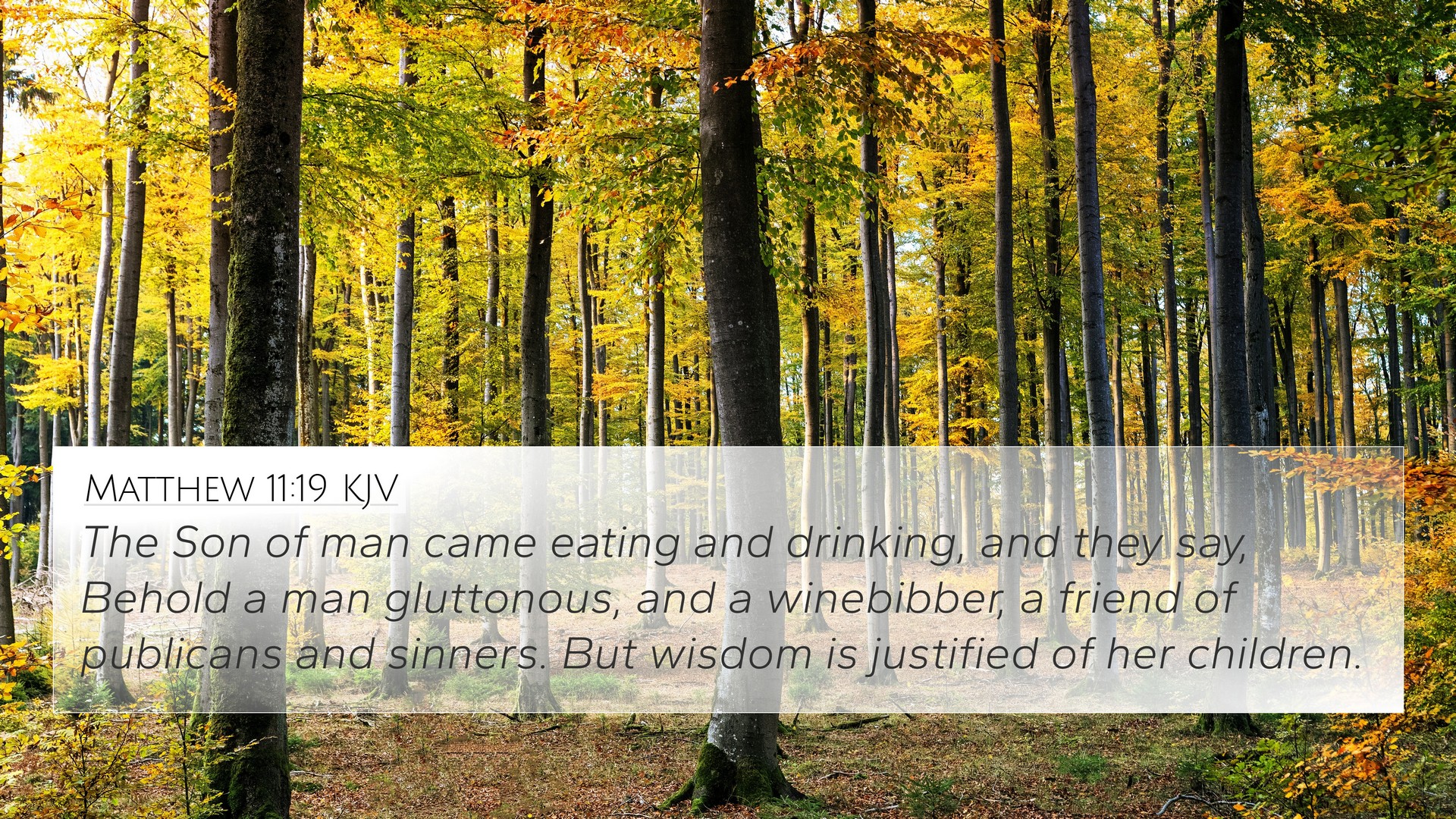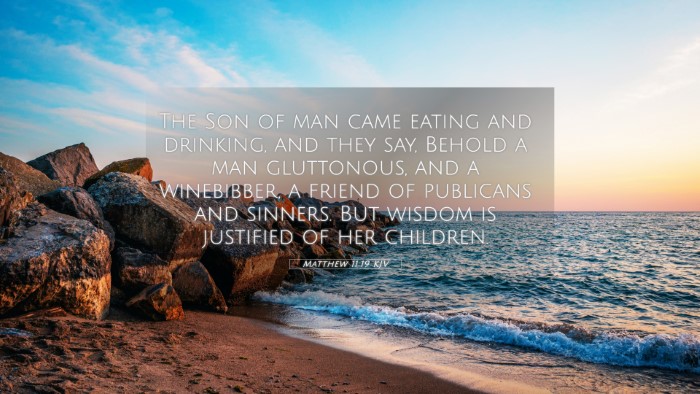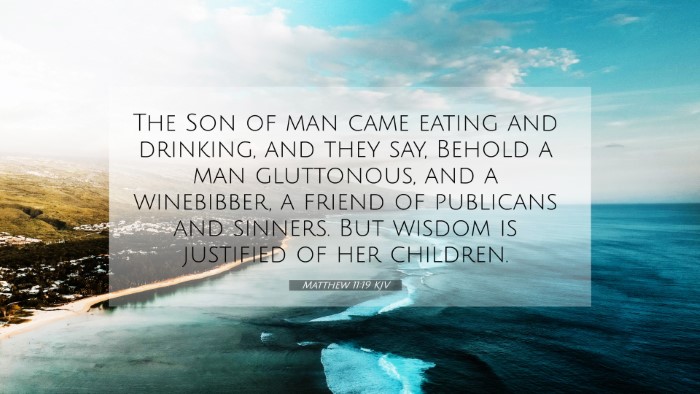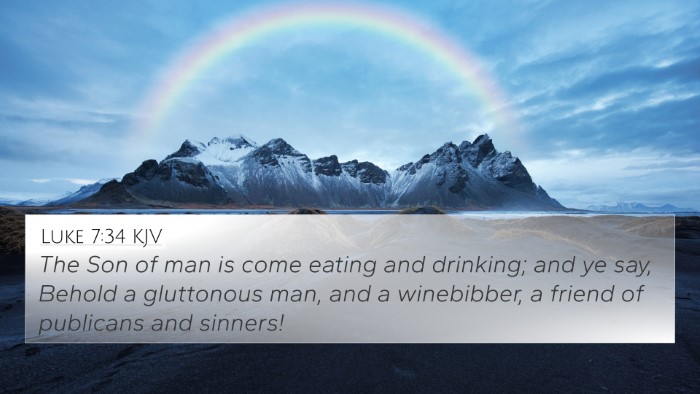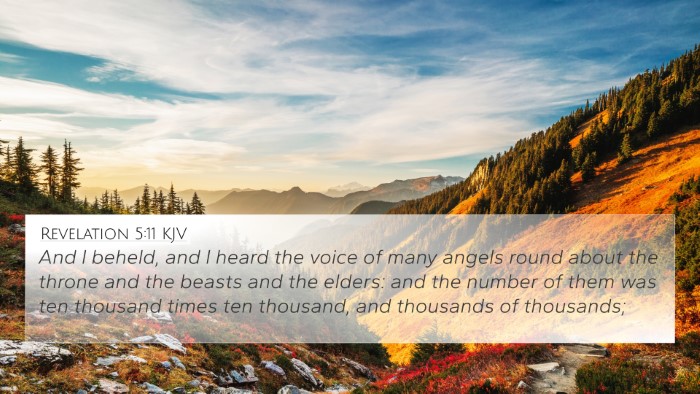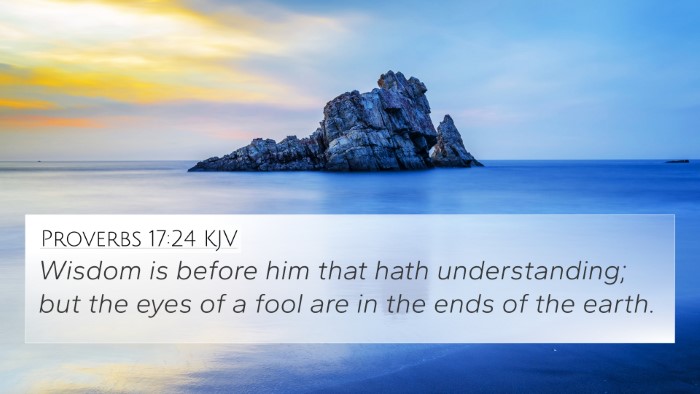Understanding Matthew 11:19
Bible Verse: Matthew 11:19 - "The Son of Man came eating and drinking, and they say, 'Look at him! A glutton and a drunkard, a friend of tax collectors and sinners!' Yet wisdom is justified by her deeds."
Summary of Interpretations
The verse highlights contrasting perceptions of Jesus's ministry. It illustrates how he was misunderstood by his contemporaries, who labeled him negatively despite his acts of compassion and friendship towards sinners.
Insights from Public Domain Commentaries
Matthew Henry Commentary
Matthew Henry emphasizes that the criticism leveled at Jesus reflects the hearts of the critics rather than the character of Jesus. His association with sinners signifies the mission to seek and save the lost, challenging societal norms and expectations.
Albert Barnes Commentary
Albert Barnes highlights the irony of the title, "friend of tax collectors and sinners." These terms were meant to disgrace Jesus, yet they denote his role as a savior. Jesus’s actions exemplify wisdom and divine purpose, despite judgment from those who misinterpret his intentions.
Adam Clarke Commentary
Adam Clarke focuses on the concept of "wisdom being justified by her deeds." He interprets this to mean that true wisdom is often recognized through the results of one's actions, positing that Jesus's ministry was vindicated by the transformations it brought in individuals’ lives.
Key Themes and Connections
This verse serves as a powerful reminder of how the righteous can face misjudgment and illustrates the theme of societal exclusion versus divine inclusion. It brings forth several thematic Bible verse connections:
- Luke 7:34: Similar critique of Jesus's association with sinners.
- Mark 2:16-17: Jesus explaining his purpose to call sinners, not the righteous.
- 1 Peter 2:12: Encouragement to live honorably amidst false accusers.
- Matthew 9:10-13: Jesus eats with tax collectors, emphasizing his mission.
- Isaiah 53:3: Prophecy of the Messiah being despised and rejected.
- James 2:1: Warning against favoritism, resonating with Jesus’s inclusive approach.
- Romans 5:8: Christ’s love for sinners echoes throughout the New Testament.
Cross-Referencing Biblical Texts
Through various tools for Bible cross-referencing, one can explore deeper meanings and intertextual dialogues that relate to Matthew 11:19:
- Utilize a Bible concordance to locate similar themes of discrimination and inclusion.
- Employ a cross-reference Bible study method to link this verse with those like John 3:17, underlining Christ's mission.
- Consider the comparative Bible verse analysis of how different gospel writers depict Jesus's interactions with societal outcasts.
Thematic Connections and User Intent
For those seeking scripture that parallels Matthew 11:19, consider:
- What verses are related to Jesus's ministry and his treatment by societal norms?
- How do old and new testament teachings inform our understanding of Jesus as a friend of sinners?
- Examining the similarities between Matthew 11:19 and Luke 15:2 regarding Jesus’s acceptance of sinners.
Concluding Thoughts
Matthew 11:19 not only sheds light on Jesus's character but also invites believers to reflect on how wisdom encompasses love and acceptance, even when misunderstood. Engaging with cross-referenced themes within the Bible enriches one’s understanding of how each verse interacts to present a coherent narrative about God's redemptive plan.
Further Studies
For a comprehensive Bible cross-reference study, consider utilizing tools that assist in identifying connections between verses, such as:
- How to use Bible cross-references to deepen your understanding.
- Bible reference resources for finding pertinent verses related to key themes.
- Cross-referencing Biblical texts to explore narratives of injustice and mercy throughout scripture.
In summary, studying Matthew 11:19 through the lens of various commentaries and cross-references opens a discussion about the nature of Jesus's ministry and the prevailing themes of wisdom, acceptance, and the enduring call to embody these truths in our own lives.
